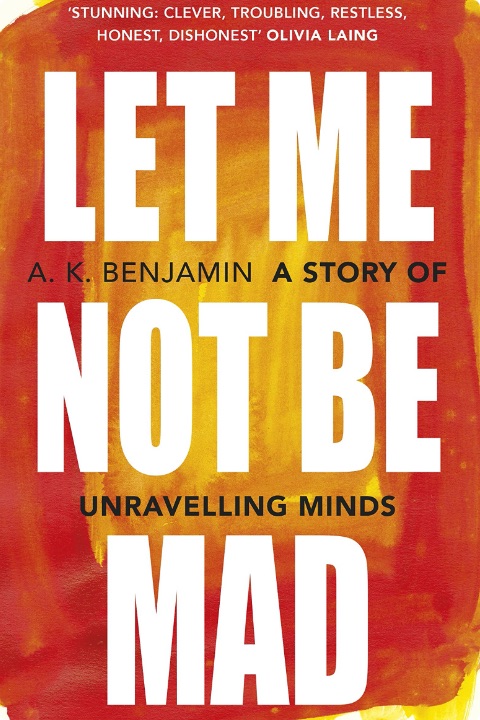The journalist Auberon Waugh, in whose time-capsule of a flat I briefly lived in 2000, once summed up what he took to be the primary motivations for writing books. ‘With women, there is this tremendous desire to expose themselves. With men, it is more often an obscure form of revenge.’
In the case of the clinical neuropsychologist Dr A.K. Benjamin, both of these seem to apply. He is impelled by the desire for revenge, mainly on his own self-important profession, but also on women for being nuts. Or perhaps, because he’s scrupulously fair about this, that should be ‘nuts in a different way from the way men are’.
As for Benjamin’s self-exposure, it’s a striptease. His maddening, saddening, slow-burn belter of a book at first seems to be a series of case studies, an episodic but more or less conventional memoir of his career. We learn about the boy who gave himself sexual thrills using a loose electrical wire from his train set. Then there’s the alpha male who suffered a TBI (traumatic brain injury) while base-jumping (the nutter!), and seemed to recover. But his family detected tiny discrepancies in his character and grew to hate him. Or perhaps, Benjamin conjectures, the injury merely gave them an excuse to indulge resentments that had long been suppressed.
The slippery nature of the truth is one of his favoured themes: the idea not just that truth is hard to pin down, but that it may not exist in the way you suppose. It’s one thing to make this argument, another to embody it in your prose — actually far harder, given the linear nature of language. Benjamin does both.
It emerges that, in a way that seems peculiarly contemporary, this book is all about him. It’s about the subjectivity, unreliability and instability of psychologists in general, and him in particular. The boy who did bad things to train sets, he later reveals, was him. You see? You can’t even rely on him to tell you what’s going on at any given moment. But there’s a point to this blurring of boundaries between patient and doctor. It’s actually the point. Gradually, as the book proceeds, it becomes clear that Benjamin’s career has been a career in more senses than one: a slow-motion lurch off the road towards the crunch of a full-blown, bells-and-whistles nervous breakdown. I know a bit about what this is like. And I know that one of the temptations, which is all the more appealing since it can be part of the cure, is then to write about it in a way that is so drunk on the sanctity of your pain, you barely bother to make it comprehensible.
In my case, the result was a tortuous novel. In Benjamin’s, it’s a first chapter that’s so overwritten as to be almost unendurable. Here’s a sample sentence: ‘Eyes: water-bubble light lassos, the heart’s stigmata.’ I’m all for mixing metaphors, but that takes the Jammie Dodger.
Yet as the chapters pass, the author finds his stride. He stops sprinting and waving his arms. And his facility for language, pin-sharp percipience, and sensitivity to micro-shifts in moods, become clear. There’s a terrific chapter in which he, the psychologist, submits himself to diagnosis by another psychologist. Thanks to Benjamin’s expertise, he realises that the other, who seems so authoritative, is actually in the first stages of undiagnosed neuro-degenerative illness. The patient suggests that the doctor book an appointment to see him, and the roles are again reversed. This process is so finely described, the result has the terse force of a classic short story.
A collection of short stories is, more and more, what this book resembles. In a preface, Benjamin admits that some of the details may be wholly imaginary. Another good one is his account of a nightmarish trekking trip he took with his (by his account) deranged Lancashire girlfriend, Sonia. He casts himself as the kindly one, and her as the romantic assassin who can fillet him with a phrase. At one point she says that, in Benjamin’s case, ‘psychotherapist’ should be two words. I quite liked the sound of Sonia. And to the author’s credit, he describes the episode in a way that makes it clear this story has as many sides as a diamond.
Although it achieves an accumulative fascination, his literary striptease never dares full nudity. A.K. Benjamin, the publishers tell us coyly, isn’t his real name. Yet as all writers of semi-autobiographical novels know, pseudonyms are the artistic equivalent of nipple tassels. Anyone who knows you will know it’s you. Or them.
And what kind of revenge would it be if they didn’t? For some reason, though, I’m reminded of a moment in the James Bond film For Your Eyes Only, when Roger Moore, with the more mobile of his eyebrows raised, remarks sternly: ‘The Chinese have a saying. Before setting out on revenge, you first dig two graves.’

